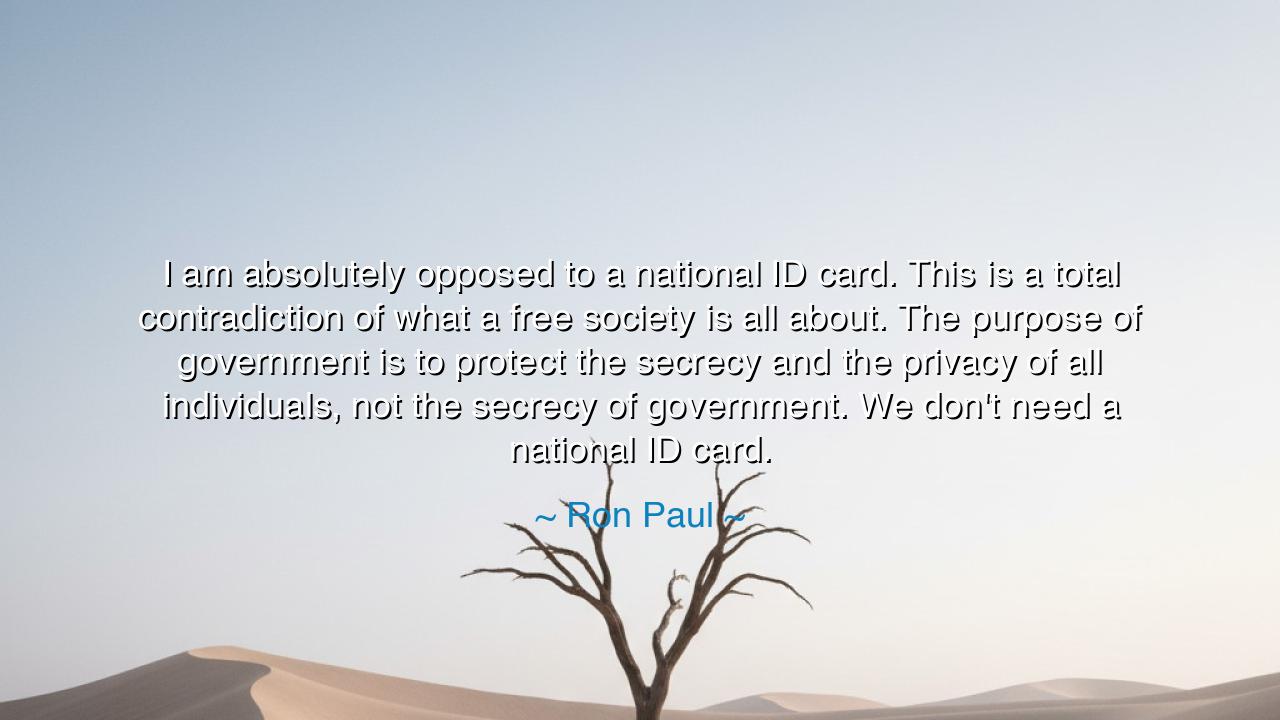
I am absolutely opposed to a national ID card. This is a total
I am absolutely opposed to a national ID card. This is a total contradiction of what a free society is all about. The purpose of government is to protect the secrecy and the privacy of all individuals, not the secrecy of government. We don't need a national ID card.






The words of Ron Paul, spoken with the fervor of a sentinel guarding the gates of liberty, ring with the wisdom of one who has spent a lifetime studying the fragile balance between freedom and power: “I am absolutely opposed to a national ID card. This is a total contradiction of what a free society is all about. The purpose of government is to protect the secrecy and the privacy of all individuals, not the secrecy of government. We don’t need a national ID card.” These words, though uttered in the modern age, carry the echo of ancient truths—the eternal struggle between the rights of the individual and the reach of the state. In his declaration, Paul speaks not merely as a politician, but as a philosopher of liberty, warning that the tools of control, once forged, never rest unused.
The origin of this quote lies in Ron Paul’s long-standing defense of constitutional principles and personal freedom. A physician by trade and a congressman by calling, Paul became known as “Dr. No” in the United States Congress for his refusal to vote for any legislation that expanded government authority beyond its constitutional limits. In debates over the Real ID Act and other federal surveillance measures, he warned that such policies were not safeguards of safety, but instruments of tyranny, disguised as protection. To him, a national ID card represented more than a piece of paper—it symbolized the state’s claim to ownership over its citizens, the transformation of free men and women into subjects cataloged by their rulers.
In the style of the ancients, let us pierce deeper into the meaning of his words. The essence of Paul’s statement rests upon the idea that in a free society, privacy is not a luxury, but a birthright. Freedom begins with the sovereignty of the individual—the belief that one’s life, choices, and movements belong first and foremost to oneself. The moment the state demands to track, tag, or record its people as though they were livestock, it steps across the sacred threshold of liberty into the domain of control. A national ID card, in his eyes, is not the mark of civilization, but the beginning of submission—a subtle chain placed around the neck of every citizen, forged in the name of security.
History bears witness to the truth of his warning. Consider the story of Nazi Germany, where the Reich Identity Card became a tool not of safety, but of persecution. What began as a bureaucratic measure to “organize society” became the means by which millions were identified, isolated, and destroyed. In the Soviet Union, the internal passport system bound every citizen to the state; movement was restricted, and identity was no longer self-owned but state-defined. Even in modern times, nations that claim to guard their people have used digital registries and surveillance systems to monitor, manipulate, and silence dissent. The machinery of control is always built with promises of safety—but once completed, it rarely serves freedom.
Ron Paul’s insight reveals the true purpose of government as envisioned by the founders of the American Republic. Government exists not to conceal its actions from the people, but to protect the people from the government. The transparency of power must be the counterbalance to the privacy of the citizen. When that order is reversed—when citizens are forced to reveal their every detail while rulers cloak themselves in secrecy—tyranny has already begun its quiet march. A national ID card, Paul warns, inverts this sacred order: the governed become transparent, while the governors grow opaque. Freedom cannot survive such an inversion; it decays beneath the cold gaze of constant observation.
But let not his words be mistaken for paranoia—they are a call to vigilance, not despair. For every age faces the same temptation: to trade freedom for the illusion of safety. To say, “Let the government protect us, even if it must know us too well.” Yet every time this trade is made, the price grows higher, and the return smaller. The wise citizen must understand that security purchased at the cost of liberty is counterfeit—it serves the rulers, not the ruled. The true defense of safety lies in responsibility, community, and the courage to guard one’s own dignity without surrendering it to authority.
So, my children of the future, take this teaching to heart: guard your privacy as you would guard your freedom, for they are one and the same. Question every law that asks you to yield more of yourself in exchange for protection. Demand that your government remain open, even as you keep your life your own. Remember that the greatest danger to liberty rarely comes from sudden tyranny, but from slow compliance—from the belief that one more law, one more card, one more database will make us secure. For as Ron Paul reminds us, the purpose of government is not to know you—it is to defend your right to be left alone.
And so let these words endure as both shield and warning: freedom ends not with the clang of chains, but with the quiet hum of surveillance. Do not let the guardians of power turn your names, your movements, your very existence into data for their keeping. The free man’s greatest possession is not wealth or status, but the sacred space of privacy—the right to live unobserved, unrecorded, and unafraid. Defend it always, for once it is lost, it can never be fully reclaimed.






AAdministratorAdministrator
Welcome, honored guests. Please leave a comment, we will respond soon